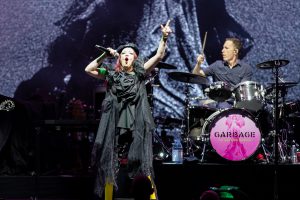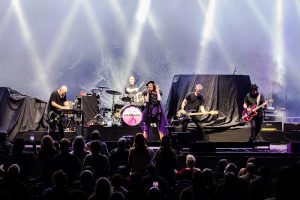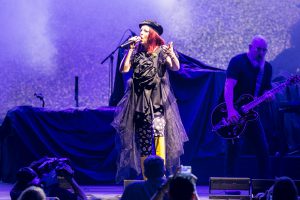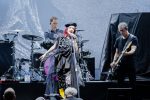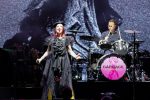REVIEW: Alanis Morissette and Garbage celebrate ‘Jagged Little Pill’ at Concord Pavilion
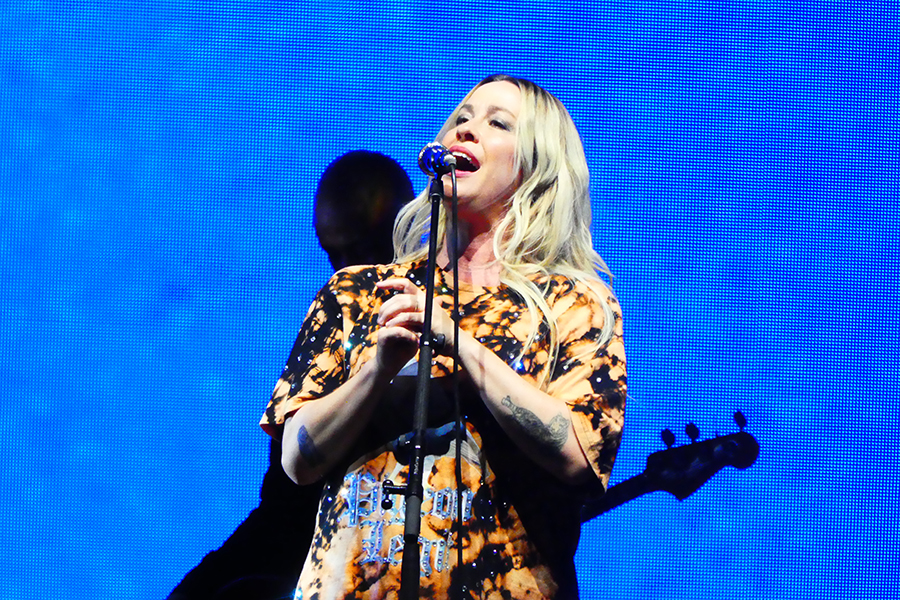
Alanis Morissette performs at Concord Pavilion in Concord, Calif. on Sept. 29, 2021. Roman Gokhman/STAFF. Garbage photos: Sean Liming/STAFF.
CONCORD — Alanis Morissette has such a powerful voice. More than 25 years after her breakthrough album, 1995’s Jagged Little Pill, you may forget how many hits that album begot and kickstarted her career. Florence Welch is a somewhat apt comparison—their voices aren’t alike, but the vocalists use them similarly—but it’s like if every single was as powerful as “Dog Days Are Over” or “You’ve Got the Love.”
Morissette, backed by a five-member band that mostly let her have the spotlight, took every chance on Wednesday to remind a packed Concord Pavilion of her songwriting chops and massive pipes during her Bay Area stop of the Jagged Little Pill 25th anniversary tour, supported by long-time friends Garbage and singer-songwriter Cat Power. The concert was originally scheduled for around this time last year, but got postponed.
The Canadian artist walked onto the stage following a video reel that showed her at various points throughout her life on television, from childhood acting gigs to “Carpool Karaoke,” “Saturday Night Live” appearances, her role as god in “Dogma” and famous friends playing her songs, Zoom-meeting-style.
Her 18-song set consisted largely of songs from the celebrated album, though she did throw in a few from 2020’s Such Pretty Forks in the Road, and numerous songs included an intro using some of her other songs. It was a sometimes effective and sometimes unnecessary way to stuff the setlist; a few of the intro snippets may have fit with the main song thematically, but not sonically.
Morissette and the band kicked things off with “All I Really Want,” set to footage from BLM and Women’s marches. As with much of the show, she paced left and right for the duration. Her vocals were a bit too low in the mix, and it was difficult to hear her at first, but when she pulled out her harmonica for the first of several riff sessions, that came through loud and clear.
“What I really want is some justice,” she screamed on the rambunctious opening.
The harmonica stayed out on “Hand in My Pocket,” which continued the pace. Think about this: How many pop artists today can open a show playing a harmonica jam on two consecutive songs?
If the meaning of the songs wasn’t clear from her well-studied lyrics, they were made brutally clear with accompanying videos that played on a huge screen behind the band. For example, empowered young women smashed through older men in suits who didn’t have the right intentions on “Right Through You.”
The videos were likely helpful for the uninitiated, but one downside was how they sometimes distracted from Alanis Morissette’s artistry. During the hard-rocking “Forgiven” (which included an opening from “Hands Clean,” off 2002’s Under Rug Swept) the star was sometimes lost amid the colorful cathedral window backdrops. “Reasons I Drink” (which included an intro using “Diagnosis”) was paired with a video of uncomfortable people at an addiction meeting.
“Ablaze” (with “So Unsexy”) scored home videos of Morissette’s children. It was touching, but I again found myself losing track of where she was on stage. And perhaps the most overt audio/video pair came on “Perfect” (with a “Nemesis” intro), which included a shot of dust-covered trophies that had lost all significance.
Luckily, when my eyes started wandering to the videos, Alanis Morissette would sing something really well and recapture my attention. She showed off her upper register on the “Everything” intro to “Mary Jane.” Even with the microphone an arm’s-length away, her voice boomed clearly. On “Head Over Feet,” she strummed an acoustic guitar and again jammed on her harmonica while the crowd provided an impressive chorus on the refrain. She charmingly ad-libbed a joke about raising kids during “You Learn.”
The emotional highpoint of the night came on “Ironic,” where she let the crowd sing entire chunks of verses and choruses. Even though she held out her mic toward fans, that was unnecessary because on this song, they would have out-sung her, anyway. Morissette closed out her main set with the explosive “You Oughta Know” (the video screen’s flames drove that point home) before returning for an encore that included “Uninvited” and “Thank U,” the latter from 1998’s Supposed Former Infatuation Junkie.
Garbage preceded the headliner with a fun and equally nostalgic 12-song set that largely covered the band’s hits, and for the most part, steered clear of its strong new album, No Gods No Masters. The band seemed in good spirits, and singer Shirley Manson in particular was talkative, engaging—even before the crowd seemed to wake up halfway through the set—and maybe a bit tipsy?
The band performed without founder and drummer Butch Vig, but his session drummer filled in admirably. The band opened with rocker “Vow,” off 1995’s self-titled album, and the new album’s title track, on which the pace picked up even more. People who haven’t yet listened to the new record stood up for ’90s hits “Stupid Girl” and “#1 Crush,” the latter of which seemed to have made the bass even louder and crunchier than in the past. Following another crowd-pleaser in “I Think I’m Paranoid,” Manson, wearing a beret and goofy dress with yellow knee-high boots, started walking in circles. Her movements mimicked the agitated tone of new track “Wolves.” Meanwhile, guitarist Steve Marker unleashed thick slabs of feedback.
Through this song, most attendees remained seated, so Manson, who was about to finish her first on-stage glass of whiskey, got to talking. First, she highlighted her band’s history with Alanis Morissette, having also opened for her on the original Jagged Little Pill tour. She talked about what it’s like to age as a woman in the entertainment industry, and gave a tribute to women over 30, whom she said many people refuse to acknowledge exist. The 55-year-old said wears her age not as shame but as a “badge of honor.”
Leading up to “Not Your Kind of People,” Manson apologized for the show having originally been postponed before yelling “Fuck COVID!” By the time he asked for a refill from a stagehand, she called the Concord audience the quietest of the tour, briefly flirted with a security guard by the stage and then chatted with a fan near the front, who she refused to approach because neither of them were wearing masks—but then went all out and had the entire band autograph the fan’s sign. She also recognized, with no prompting, long-time Bay Area music photographer Steve Jennings, who she said has photographed Garbage since 1994.
The band then kicked into an enthusiastic take of “Special” and “Wicked Ways,” which included a bit of Depeche Mode’s “Personal Jesus.” By this point, many were firmly on their feet, showing once again that whiskey is all that’s needed to start a party.
Manson preceded 1998 single “When I Grow Up” with a story of how Adam Sandler called her in her hotel room and asked to use it in the film “Big Daddy.” She explained that Garbage continues to play that song, even though they’ve all grown up a long time ago, because the song isn’t about physical age but maturity.
“You can stay young and a hot mess as long as you want!” she declared.
Garbage finished up with two more hits in “Push It” and “Only Happy When It Rains.” The closer began as, of all things, a lounge tune with a piano-led intro, before briefly transitioning for a couple of lines into a Brill Building version of the song. Soon after, the guitars kicked in to the version everyone knows.
Cat Power opened the show with a brief solo set, playing in near darkness with just some dim red lamps and a neon red “cp” projected on the screen that looked like a bent cross at a down on its luck church.
With a reverb-drenched guitar she meandered through songs like “Fool,” a cover of Michael Hurley’s “Werewolf” and slightly unnerving “Metal Heart,” which she described as “an old song from when I was a young girl.” A cover of The Rolling Stones’ “(I Can’t Get No) Satisfaction” was unrecognizable, sparse and dirgelike. Power sang in near monotone on “Great Expectations” while playing a simple chord progression. “Good Woman” was more sonically diverse and showed the range in her voice.
She then moved to a stand-up piano where she built an orchestral rumble on “Nothin’ but Time” before concluding with “The Greatest.”
Between acts, video screens showed information about reporting abuse and sexual assault, help for dealing with postpartum depression and empowering messages about fighting misogyny. Several organizations like the National Alliance on Mental Illness were on hand to talk to attendees as well.
- Garbage performs at Concord Pavilion in Concord, Calif. on Sept. 29, 2021.
- Garbage performs at Concord Pavilion in Concord, Calif. on Sept. 29, 2021.
- Garbage performs at Concord Pavilion in Concord, Calif. on Sept. 29, 2021.
- Garbage performs at Concord Pavilion in Concord, Calif. on Sept. 29, 2021.
- Garbage performs at Concord Pavilion in Concord, Calif. on Sept. 29, 2021.
- Garbage performs at Concord Pavilion in Concord, Calif. on Sept. 29, 2021.
- Garbage performs at Concord Pavilion in Concord, Calif. on Sept. 29, 2021.
- Garbage performs at Concord Pavilion in Concord, Calif. on Sept. 29, 2021.
- Garbage performs at Concord Pavilion in Concord, Calif. on Sept. 29, 2021.
- Garbage performs at Concord Pavilion in Concord, Calif. on Sept. 29, 2021.
- Garbage performs at Concord Pavilion in Concord, Calif. on Sept. 29, 2021.
- Garbage performs at Concord Pavilion in Concord, Calif. on Sept. 29, 2021.
- Garbage performs at Concord Pavilion in Concord, Calif. on Sept. 29, 2021.
- Garbage performs at Concord Pavilion in Concord, Calif. on Sept. 29, 2021.
- Garbage performs at Concord Pavilion in Concord, Calif. on Sept. 29, 2021.
- Garbage performs at Concord Pavilion in Concord, Calif. on Sept. 29, 2021.
Follow editor Roman Gokhman at Twitter.com/RomiTheWriter. Follow photographer Sean Liming at Instagram.com/S.Liming.



